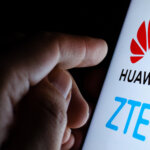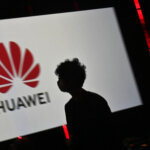Seagate fined for supplying Huawei in latest anti-China move

|
Getting your Trinity Audio player ready...
|
Seagate has been fined $300 million for historically supplying hard drives to Huawei – after the Chinese company was put on the US’ Entity List.
Being on the list means you face particular restrictions on your ability to buy and sell with US companies, and Huawei was one of the first Chinese companies to make it onto the list in recent years, in 2019 under the Presidency of Donald Trump. That year, Huawei, one of the world’s largest tech firms, was set to overtake Samsung as the world’s biggest smartphone supplier.
A national security risk?
Rumors, which to say the very least have never been satisfactorily corroborated in the public domain, circulated that Huawei was a national security risk, potentially feeding data to the Chinese government – an accusation that will sound familiar to anyone following the more recent TikTok case.
Nevertheless, Huawei found itself suddenly very short on American-made parts to build its consumer tech.
Seagate became one of only a handful of US suppliers of hard drives to Huawei between 2019-2021, in defiance of the fact that Huawei was on the list, and two more suppliers (Western Digital and Toshiba) fell away from the company in 2020.
The new fine comes as a result of those historic sales, amounting to $1 bn worth of hard drives over the course of two years. In something of a “the dog ate my homework” plea, Seagate said it had not realized it was breaking the terms of Huawei’s Entity List status because, even though Seagate itself is headquartered in the US, the drives it sold Huawei were manufactured outside the States, and so were not “the direct product of US equipment.”
The Commerce Department’s Bureau of Industry, in explaining the hefty fine as a consequence of Seagate’s actions in selling to an Entity List company, said Seagate had misinterpreted the foreign product rule, believing it only applied to the last stage of the manufacturing, rather than to the entire process, which was the real case.
It’s unlikely that any company will try that excuse again after Seagate has found itself burdened by the highest fine in the history of the Bureau that wasn’t linked to a criminal case.
The wider impact.
The impact though is likely to be far wider-reaching than Seagate’s bottom line, which is going to suffer to the tune of $15 m per quarter, every quarter, for the next five years.
The Huawei Entity List Seagate fine relates to 2019-2020. Since then, Huawei, rather than the potentially intended effect of crawling away to die, has rebuilt itself, sourcing high-tech components from other countries.
Then in November 2022, Huawei – again alongside a smattering of other Chinese companies – was subject to a ban on acquiring new components from US manufacturers. It would be a small logic leap to characterize the move as kicking Huawei not when it was down, but because it dared to get back up again.
And, as in 2019, the rationalization for the move, this time under current President Joe Biden, was “security.” Again, the case for Huawei’s threat to US security has not been in any sense proved out in the public domain. There have been occasional attempts to dig into the source of these stories, but very little emerges with any concrete certainty,
The Sinophobic factor.
No-one is particularly claiming that the Chinese government is kind to children, puppies, its citizens, or even the citizens of other declared sovereign nations. But you need a degree of paranoia to connect the Chinese government with the actions of companies that have headquarters in China.
That’s the danger signalled by the new Seagate fine. There is more than a degree of paranoia in Washington right now – there’s a doctorate of it.
Coming from a place of economic protectionism, and aiming to rebalance the American economy for the next fifty years with a leading edge in cutting-edge technology – which has been described as “the oil of the mid-21st century” – presidents back as far as Barack Obama, through Trump, and on to Biden, have been tightening the screws on Chinese technology manufacture and export.
But while Huawei’s particular difficulties began in the colourful days of Twitter invective, executive orders and Madman Theory 2.0 foreign policy that was Donald Trump’s (first) presidency, it’s arguable that no president in modern times has prosecuted an economic policy with more overtly Sinophobic tones and consequences than President Biden.
From the strings attached to CHIPS Act funding, which prevent any US company that wants a piece of the pie from selling components beyond a certain level of sophistication to China, to encouraging multinationals in the tech industry to decouple their production and supply chains from Chinese factories (where businesses were perfectly happy to reap the benefits of exploited citizen-workforces for decades), the Biden White House, and increasingly the current Congress, has appeared happy to demonize not just the Chinese government, which many external observers would see as fair, but also any leading companies with their headquarters in the country.
The notion of tarring leading Chinese companies with the same brush as could legitimately be used on the Chinese government began with Huawei, and continues in the almost morbidly self-defeating war against TikTok (again on spurious, poorly proven grounds of “national security”).
Check your supply chains…
So with Seagate having settled on a record-breaking fine for continuing to supply Huawei with parts, the trend towards techno-McCarthyism should probably put several other leading firms if not on notice, then at least on alert to make sure their relationships with Chinese companies in subsequent, post-2019 years are clearly delineated, and don’t blur the lines at all. Late 2022 and early 2023 saw the US government tighten and re-tighten the rules by several entire notches for tech companies with either manufacturing or supply chain partners or investments in China.
Now we’re in the age of fining big players hundreds of millions of dollars for doing business with Chinese companies, and the accusation of “security risk” is waiting for any Chinese company that potentially threatens Western techno-supremacy, those with complex supply chain connections in China may be motivated to ensure they’re free and clear, despite the monstrous complexity of decoupling from China – just in case the government decides that it has grounds to fine them too.











